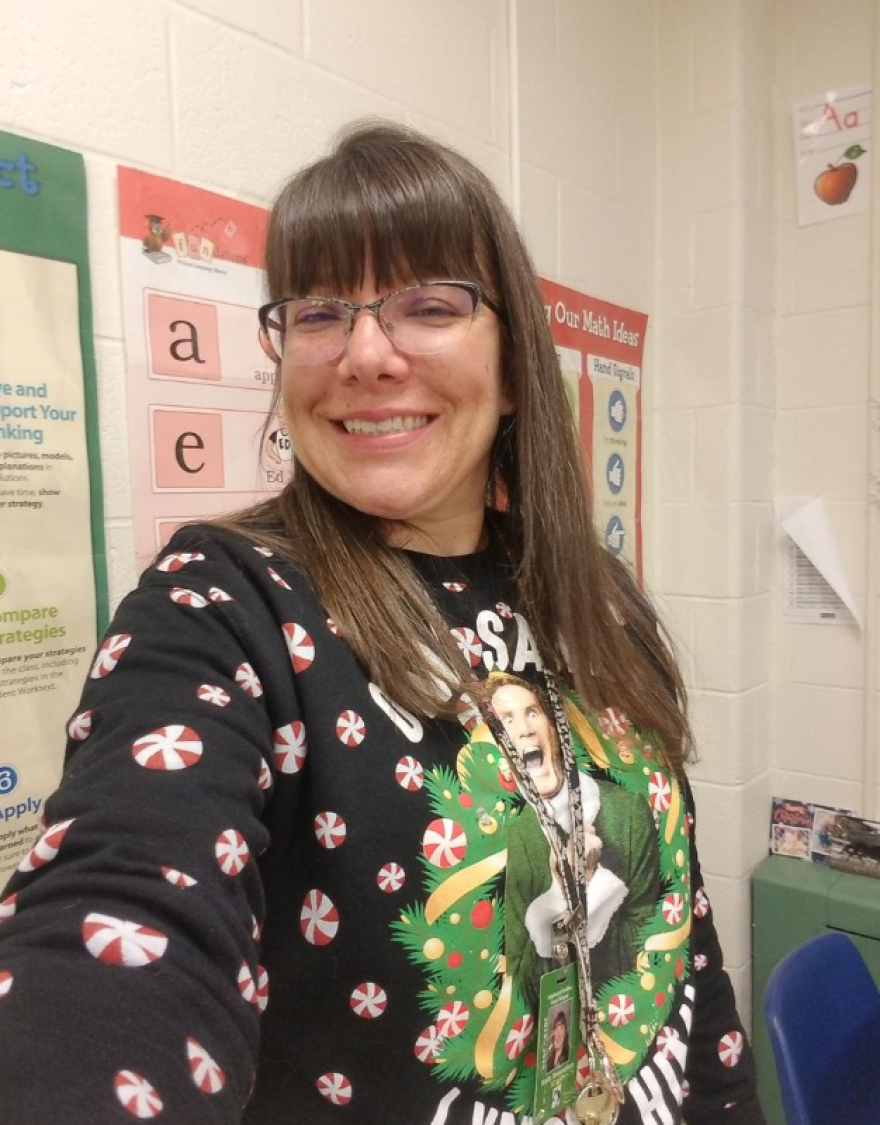School districts are facing a lot of unknowns. One of the biggest questions is whether teachers with health concerns have to return to school or if they can work remotely. NHPR’s Sarah Gibson caught up with three teachers in the midst of figuring out how their districts will accommodate them, and whether that will be enough.
Beth Franke has two families. There’s her husband and relatives, and then there’s what she calls her “work family,” the teachers and students at John Stark Regional High School.
Franke runs the academic support center and teaches special education there. She’s the kind of teacher who keeps snacks for students in her desk, and always knows what homework they owe and what they’re struggling with at home.
"Many of the students call me Mama Franke,” she laughs. “I become their school mom - they call me 'school mom.' Some just call me 'mom'.”
Normally Franke would be excited to see her work family again, but when she learned schools were planning to reopen, she started panicking. Both Franke and her husband have underlying conditions that could lead to serious complications if they get COVID-19.
“I can count maybe on one hand how many times I have actually gone out in the last few months, because of my risk,” Franke says.
"People need to be flexible, which I am. I just want to be able to keep my job but not risk my life doing that." - Beth Franke

Franke is in a conundrum that hundreds of teachers are facing - she loves her job, but returning feels too risky, even if the school institutes good safety measures. Franke’s conditions are serious enough that she’s working with her union and district to get an accommodation under disability law.
She hopes to get matched virtually with students in the district who opt to learn remotely this year.
“People need to be flexible, which I am. I just want to be able to keep my job but not risk my life doing that,” she says.
For Franke, the options are clear: either she gets permission to work remotely, or she resigns. But for many other teachers, the decision is less black and white.
Take the household of Kelly Bresnahan, a special ed teacher in Manchester. She has two school-age kids who go to school in another district and she is raising her oldest child’s kids, ages 2 and 5.
She has a lot to juggle during the pandemic. Bresnahan herself has asthma - making her higher risk for COVID-19. And her grandkids both have cystic fibrosis, which makes their health fragile to begin with. They both take dozens of pills a day, and one uses a feeding tube.
“The CF already causes them to have to fight every day. And then if they get COVID, to have to fight those side effects on top of the CF? It’s just ...” Bresnahan sighs.
Going back to school introduces a long list of unknowns into this family’s life.
With her grandson sitting on her lap, Bresnahan wonders aloud: Is it possible to contract the virus from her first grade students? Do the educational benefits of in-person school for her kids and grandkids outweigh the risks?
“Maybe I’m stressing out too much and it’s not going to be bad,” she says. “Maybe it’s perfectly normal to stress out and it’s going to be bad.”

That’s why Bresnahan is debating whether to keep her whole family home next year - she and her husband would oversee remote learning.
And if her district allows it, she would work remotely.
“I want to work,” she says. “I love working. I love teaching, so it makes me sad to take a leave of absence. I don’t want this disease to win, take over my life and trap me.”
And then there are teachers’ financial concerns.
Trevor Duval, a high school teacher in Hollis, is terrified of bringing the coronavirus home to his wife, who has kidney disease and is fighting cancer.
“If my wife gets COVID it’s because I brought it into the home,” he says. “There’s a level of guilt that I don’t think I would ever be able to forgive myself for.”
Protections under disability law and coronavirus legislation don’t do much for a teacher who’s healthy but whose spouse is sick. So Duval’s options are limited.
“I can apply for family medical leave,” he says. “But then I’m getting reduced pay. We are a single income family, so that’s not a great option. I can request a leave of absence for a year. Or I could resign, which means I have no income and no health insurance.”
With his wife undergoing cancer treatment, losing health insurance isn't an option, so there’s a good chance Duval will return to school. The couple plans to assess the school’s new safety guidelines and, if they don’t seem strict enough, Duvall may move into their finished basement to protect his wife's health.
They would continue sharing the kitchen and having socially distanced meals, but they might limit close contact for the whole year.
______________
COVID and The Classroom: NHPR wants to understand how this unusual school year is playing out across the state. Every few weeks, we'll ask you to answer a new question. The latest: How has going back to school been different for you this year? Give us a few examples here to help us tell the story.









